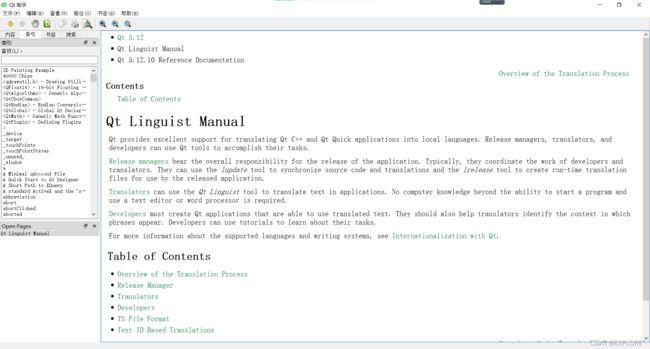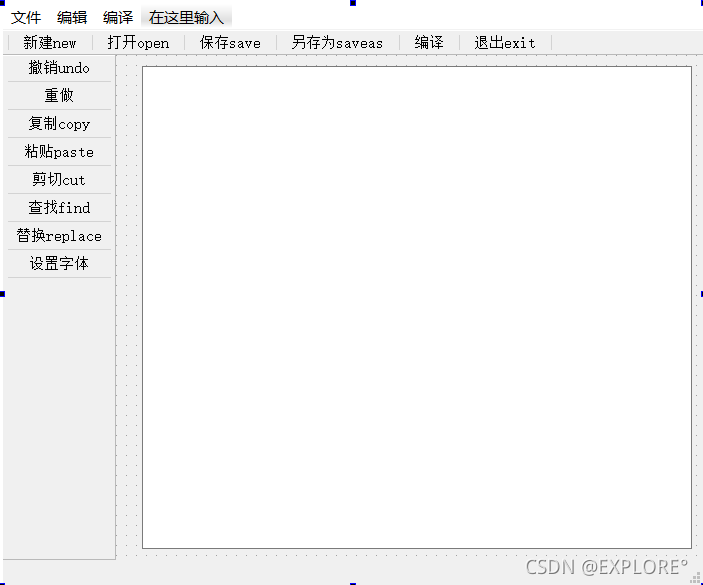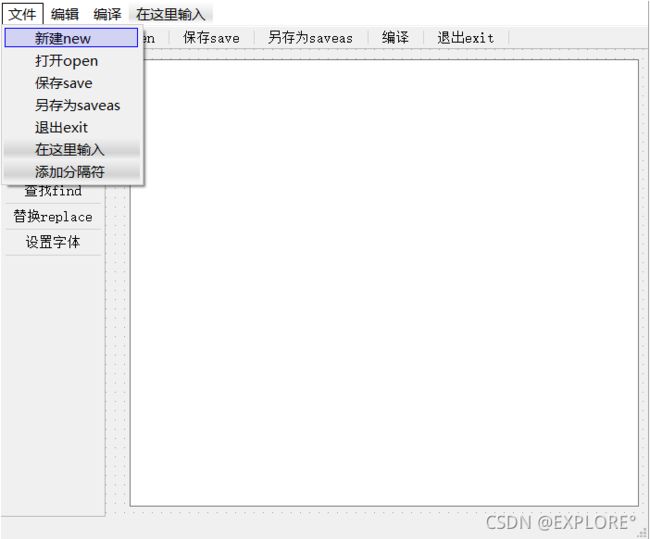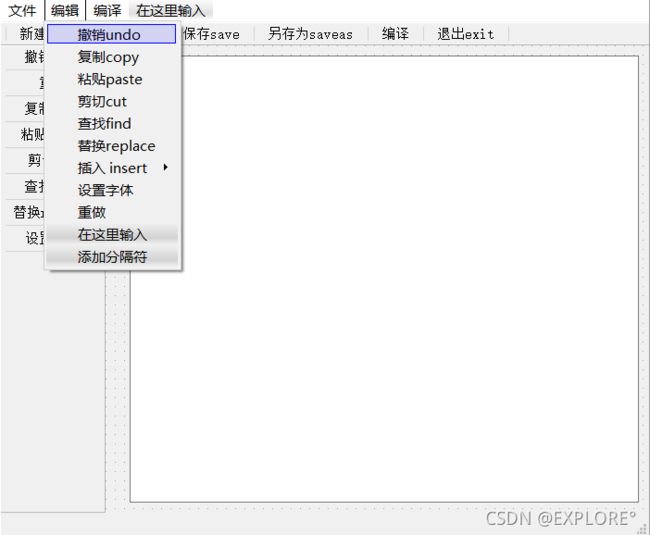利用QT Creator(4.13.1)开发基于C++语言的C语言集成开发环境(IDE)
目录
前言
一、QT Creator 的概述
(一)QT Creator 的介绍
(二) QT Creator 的历史
(三)下载与安装
1.下载地址:
2.安装: 默认安装(建议组件全部选中)
(四)成功案例
二、基本功能性能要求
(一)基本功能要求:
1.提供基本编辑功能:
2.提供编译运行功能:
(二)基本性能要求
三、开发过程
(一)项目建立及框架构建
1.建立项目
2.框架构建
(二)各项基本功能的建立
1.新建
2.打开
3.保存
4.退出
5.另存为
6.撤销
7.复制拷贝
8.剪切+粘贴
9.编译
10. 查找
11.停止查找
12.查找下一个
13.全文替换
14.结束替换
15.插入各组槽函数(DATA、for循环、while循环、do_while循环、switch、if、Class)
(三)部分实用小功能的添加
1.快捷键的添加
2.字体设置
3.工具栏图片资源添加
三、运行效果
总结
前言
同学们在学习完C++后都不免有许多疑惑。例如,有些简单的能用C语言解决的问题为什么要用C++呢?学习了C++语言我该怎么使用呢?C++语言的优势如何体现呢?
接下来,作者将以一个实例(利用QT Creator 4.13.1开发基于C++语言的C语言集成开发环境)体现C++语言的优势。因此本文主要讲的是如何开发一个简易的C语言IDE。而同学们需要跟着学习制作这个简易的IDE以体会C++语言的优势所在。
一、QT Creator 的概述
(一)QT Creator 的介绍
Qt Creator是跨平台的 Qt IDE, Qt Creator 是 Qt 被 Nokia 收购后推出的一款新的轻量级集成开发环境(IDE)。此 IDE 能够跨平台运行,支持的系统包括 Linux(32 位及 64 位)、Mac OS X 以及 Windows。根据官方描述,Qt Creator 的设计目标是使开发人员能够利用 Qt 这个应用程序框架更加快速及轻易的完成开发任务。
Qt Creator 包括项目生成向导、高级的 C++ 代码编辑器、浏览文件及类的工具、集成了 Qt Designer、Qt Assistant、Qt Linguist(里边的QT助手在开发过程中很有帮助)、图形化的 GDB 调试前端,集成 qmake 构建工具等。
(二) QT Creator 的历史
1991年 Qt最早由奇趣科技开发
1996年 进入商业领域,它也是目前流行的Linux桌面环境KDE的基础
2008年 奇趣科技被诺基亚公司收购,Qt称为诺基亚旗下的编程语言
2012年 Qt又被Digia公司收购
2014年4月 跨平台的集成开发环境Qt Creator3.1.0发布,同年5月20日配发了Qt5.3正式版,至此Qt实现了对iOS、Android、WP等各平台的全面支持。
(三)下载与安装
1.下载地址:
www.qt.io/download-open-source/![]() http://www.qt.io/download-open-source/
http://www.qt.io/download-open-source/
2.安装: 默认安装(建议组件全部选中)
(详细的QT Creator基础使用手册私信请作者获取)
(四)成功案例
- Linux桌面环境KDE
- WPS Office 办公软件
- Skype 网络电话
- Google Earth 谷歌地图
- VLC多媒体播放器
- VirtualBox虚拟机软件
- …
废话不多说,进入正题~
二、基本功能性能要求
编写一个简单的C语言集成开发环境IDE
(一)基本功能要求:
1.提供基本编辑功能:
- 支持键盘/鼠标操作,必要的菜单操作
- 建立文件,保存/打开/另存/关闭
- 对字符/串的插入、删除、查找、替换
- 对文本块的复制、粘贴、剪切
2.提供编译运行功能:
-
能够进行编译/链接,并反馈编译结果
-
对通过 编译的程序投入运行并给出执行结果
(二)基本性能要求
-
支持单文件编辑,文本长度不超过2000行
-
装入/保存2000行源程序
-
基本操作(插入/删除/查找等)响应无明显延迟
三、开发过程
1.在开发之前同学们需要利用学习手册先了解QT Creator 的一些基本操作。(学习手册私信作者获取)
2.安装好Linguist 5.12.10 (MSVC 2017 64-bit),开发过程有不懂的地方都可以在上面查找。
QT助手打开方式:打开Linguist -> 点击菜单栏的“帮助” -> 点击 QT 助手;
结果如下图:
(可以在左侧查找框搜索所需内容)
(一)项目建立及框架构建
1.建立项目
选用ui设计师模式对界面基本框架进行构建,添加相应的菜单栏、工具栏、文本编辑框、状态栏等。
mainwindow.cpp中加入相应初始化代码:
ui->setupUi(this);
setCentralWidget(ui->textEdit);//自适应窗口大小
flag=utf8;//初始化,默认flag显示utf-8
codec=QTextCodec::codecForName("gbk"); //字符编码指针初始化
QString str;
str=ui->textEdit->toPlainText();
path="";2.框架构建
(1)“文件”菜单项内容添加:
(3)“编译”菜单项无子菜单项
(二)各项基本功能的建立
对各项功能的建立即槽函数的填充, QT Creator 最核心的就是信号与槽的概念。在ui设计界面的下端排列有建立的action,右键点击其中一栏,点击“转到槽”即可跳转到该action槽函数的设置。
各个功能槽函数都在下面给出,并由相应注释进行解释。
QT的语言库中包含了非常丰富的函数库,同学们可以在QT助手当中查找相应用法并加以利用。
1.新建
方便后边使用,在mainwindow.cpp 中添加可能会用到的头文件:
#include "mainwindow.h"
#include "ui_mainwindow.h"
#include
#include
#include
#include
#include
#include
#include
#include
#include
#include
#include
#include
#include
#include
#include
#include “建立”功能槽函数:
ui->textEdit->clear();
path="";2.打开
path=QFileDialog::getOpenFileName();//打开一个文件,获取此文件目录
if(path.isEmpty()) {return;}//如果没有选择路径
char *fileName= codec->fromUnicode(path).data();
FILE* fp=fopen(fileName,"rb");//打开文件,fopen(),如果有中文,需要gbk
if(fp==NULL){ //打开失败
return;
}//循环读取文件内容fgets(),读取内容char*
char buf[2048];QString str="";//读之前,清空buf内容
while(1)
{
memset(buf,0,sizeof(buf));
fgets(buf,sizeof(buf),fp);
if(flag==utf8){str=str+buf;}
else if(flag==gbk)
{
str=str+codec->toUnicode(buf);
}
if(feof(fp)) {break;} //如果文件结束,结束循环
}
ui->textEdit->setText(str);//需要把读取的内容给编辑区设置setText3.保存
if(path.isEmpty())//如果路径为空,没选择路径,需选择路径
{ path=QFileDialog::getSaveFileName();//不空,将内容保存到原来的路径 打开文件,获取编辑器内容 保存文件 关闭文件
if(path.isEmpty()) {return;}
}
char *fileName=codec->fromUnicode(path).data();//将utf-8替换成gbk,同时将QString转换为char*
FILE* fp=fopen(fileName,"wb");//打开文件,fopen(),需要的路径为char*,有中文要gbk
if(fp==NULL) {return;}//打开失败
QString str=ui->textEdit->toPlainText();//获取编辑区内容QString
const char * buf=str.toStdString().data();//将编辑区内容QString转为char*
fputs(buf,fp);//将编辑区内容写入文件fputs
fclose(fp);//关闭文件4.退出
exit(0);5.另存为
path=QFileDialog::getSaveFileName();//选择文件保存路径
if(path.isEmpty()) {return;}
qDebug()<fromUnicode(path).data();//将utf-8替换成gbk,同时将QString转换为char*
FILE* fp=fopen(fileName,"wb");//打开文件,fopen(),需要的路径为char*,有中文要gbk
if(fp==NULL) {return;}//打开失败
QString str=ui->textEdit->toPlainText();//获取编辑区内容QString
const char * buf=str.toStdString().data();//将编辑区内容QString转为char*
fputs(buf,fp);//将编辑区内容写入文件fputs
fclose(fp);//关闭文件 6.撤销
ui->textEdit->undo();7.复制拷贝
ui->textEdit->copy();8.剪切+粘贴
剪切:
ui->textEdit->cut();粘贴:
ui->textEdit->paste();9.编译
if(path.isEmpty()) { //已经完成编写,但还未保存,则先进行保存操作
if(ui->textEdit->document()->isEmpty()){return;};
path=QFileDialog::getSaveFileName();
if(path.isEmpty()) {return;}//路径为空则返回,不空,将内容保存到原来的路径 打开文件,获取编辑器内容 保存文件 关闭文件
char *fileName=codec->fromUnicode(path).data();//将utf-8替换成gbk,同时将QString转换为char*
FILE* fp=fopen(fileName,"wb");//打开文件,fopen(),需要的路径为char*,有中文要gbk
if(fp==NULL) {return;}//打开失败
QString str=ui->textEdit->toPlainText();//获取编辑区内容QString
const char * buf=str.toStdString().data();//将编辑区内容QString转为char*
fputs(buf,fp);//将编辑区内容写入文件fputs
fclose(fp);//关闭文件
}
QString demo=path;
demo.replace(".c","");//将demo内部的字符.c替换为空字符
QString cmd=QString ("gcc %1 -o %2").arg(path).arg(demo);//如果有中文,需要gbk,同时将QString转化为char*
int ret=system(codec->fromUnicode(cmd).data());//如果编码正确,system返回值为0
if(ret!=0){ //如果代码出错,再编译一次
cmd=QString ("cmd /k gcc %1 -o %2").arg(path).arg(demo);
system(codec->fromUnicode(cmd).data());
return;}
QString target=QString ("cmd/k %1").arg(demo);//执行到这一步,编译成功,需要执行程序
system(codec->fromUnicode(target).data());
10. 查找
在mainwindow.h头文件中的私有成员处声明全局变量:(由于涉及到查找的一些其他操作,因此一下变量需设置成全局变量)
QLineEdit *findLineEdit;
QDialog *findDlg;mainwindow.cpp源文件中的构造函数:
findDlg = new QDialog(this);//创建对话框
findDlg->setWindowTitle(tr("查找"));//设置对话框标题
findLineEdit = new QLineEdit(findDlg);//创建QLineEdit
QPushButton *btn= new QPushButton(tr("查找"), findDlg);//创建查找按钮
QPushButton *btn1= new QPushButton(tr("结束查找"), findDlg);//创建结束查找按钮
QPushButton *btn2= new QPushButton(tr("查找下一个"), findDlg);//创建查找下一个按钮
QVBoxLayout *layout= new QVBoxLayout(findDlg);//创建layaout
layout->addWidget(findLineEdit);//将创建的QLineEdit、Button放置在layout上
layout->addWidget(btn);
layout->addWidget(btn2);
layout->addWidget(btn1);
connect(btn, SIGNAL(clicked()), this, SLOT(on_actionchao_triggered()));//连接
connect(btn1, SIGNAL(clicked()), this, SLOT(tingzhicahzhao ()));
connect(btn2, SIGNAL(clicked()), this, SLOT(chazhaoxiayige ()));
查找槽函数:
int flag=0;
findDlg->setFixedSize(400,300);
findDlg->show();//显示对话框
QString str=findLineEdit->text();//获取输入的string
QTextDocument *document = ui->textEdit->document();//定义QTextDocunment对象
bool found = false;
QTextCursor highlight_cursor(document);
QTextCharFormat color_format(highlight_cursor.charFormat());
color_format.setForeground(Qt::black); //设置字体颜色
color_format.setBackground(Qt::yellow); //设置背景颜色
while (!highlight_cursor.isNull() && !highlight_cursor.atEnd()&&str!="")
{
//查找指定的文本,匹配整个单词
highlight_cursor = document->find(str, highlight_cursor, QTextDocument::FindWholeWords);
if (!highlight_cursor.isNull())
{
if (!found) found = true;
highlight_cursor.mergeCharFormat(color_format),flag++;
}
}
if(flag==0&&str!="") {
QMessageBox::warning(this, tr("查找"),tr("找不到%1").arg(str));
}11.停止查找
QString str1=findLineEdit->text();
QTextDocument *document = ui->textEdit->document();
bool found = false;
QTextCursor highlight_cursor(document);
QTextCharFormat color_format(highlight_cursor.charFormat());
color_format.setForeground(Qt::black); //字体颜色
color_format.setBackground(Qt::white); //背景颜色
while (!highlight_cursor.isNull() && !highlight_cursor.atEnd()&&str1!="")
{
//查找指定的文本,匹配整个单词
highlight_cursor = document->find(str1, highlight_cursor, QTextDocument::FindWholeWords);
if (!highlight_cursor.isNull())
{
if (!found) found = true;
highlight_cursor.mergeCharFormat(color_format);
}
}
findLineEdit->clear();
findDlg->close();12.查找下一个
QString str2=findLineEdit->text();
QTextDocument *document = ui->textEdit->document();
bool found = false;
QTextCursor highlight_cursor(document);
QTextCharFormat color_format(highlight_cursor.charFormat());
color_format.setForeground(Qt::black); //字体颜色
color_format.setBackground(Qt::white); //背景颜色
while (!highlight_cursor.isNull() && !highlight_cursor.atEnd()&&str2!="")
{
//查找指定的文本,匹配整个单词
highlight_cursor = document->find(str2, highlight_cursor, QTextDocument::FindWholeWords);
if (!highlight_cursor.isNull())
{
if (!found) found = true;
highlight_cursor.mergeCharFormat(color_format);
}
}
findLineEdit->clear();13.全文替换
在mainwindow.h头文件中的私有成员处声明全局变量:(由于涉及到替换的一些其他操作,因此一下变量需设置成全局变量)
QDialog *replaceDlg;
QLineEdit *replaceLineEdit_1;
QLineEdit *replaceLineEdit_2;mainwindow.cpp源文件中构造函数所需加入内容:
replaceDlg=new QDialog;
replaceDlg->setWindowTitle("全文替换");
QLabel *Rlable_1= new QLabel(tr("想用:"), replaceDlg);
replaceLineEdit_1 =new QLineEdit(replaceDlg);
QLabel *Rlable_2= new QLabel(tr("替换:"), replaceDlg);
replaceLineEdit_2 =new QLineEdit(replaceDlg);
QVBoxLayout *Rlayout= new QVBoxLayout(replaceDlg);
Rlayout->addWidget(Rlable_1);
Rlayout->addWidget(replaceLineEdit_1);
Rlayout->addWidget(Rlable_2);
Rlayout->addWidget(replaceLineEdit_2);
QPushButton *Rbtn_1= new QPushButton(tr("替换!"), replaceDlg);
QPushButton *Rbtn_2= new QPushButton(tr("结束替换"), replaceDlg);
Rlayout->addWidget(Rbtn_1);
Rlayout->addWidget(Rbtn_2);
connect(Rbtn_1, SIGNAL(clicked()), this, SLOT(on_actionhuan_triggered()));
connect(Rbtn_2, SIGNAL(clicked()), this, SLOT(jieshutihuan()));全文替换函数:
replaceDlg->setFixedSize(400,300);
replaceDlg->show();
QString str1=replaceLineEdit_1->text();
QString str2=replaceLineEdit_2->text();
QString str3;
QTextDocument *document = ui->textEdit->document();
bool found = false;
QTextCursor replace_cursor(document);
while (!replace_cursor.isNull() && !replace_cursor.atEnd()&&str2!=""&&str1!="")
{
//查找指定的文本,匹配整个单词
replace_cursor = document->find(str2, replace_cursor, QTextDocument::FindWholeWords);
if (!replace_cursor.isNull())
{
if (!found) found = true;
replace_cursor.removeSelectedText();
replace_cursor.insertText(str1);
}
}
replaceLineEdit_1->clear(),replaceLineEdit_2->clear();14.结束替换
replaceDlg->close();15.插入各组槽函数(DATA、for循环、while循环、do_while循环、switch、if、Class)
/*insert部分中的Date*/
void MainWindow::on_actionDate_triggered()
{
QTextDocument *document = ui->textEdit->document();//获取文档
QTextCursor Datecursor(document);//定义光标
QString Date;//定义承接时间的字符串
Date = QDateTime::currentDateTime().toString("yyyy-MM-dd hh:mm:ss");//获取系统时间
Datecursor.insertText(Date);//再光标处插入系统时间
}
/*insert部分中的for循环*/
void MainWindow::on_actionfor_triggered()
{
QTextDocument *document = ui->textEdit->document();//获取文档
QTextCursor for_cursor(document);//定义光标
QString for_string="for(;;){\n}";
for_cursor.insertText(for_string);
}
/*insert部分中的while循环*/
void MainWindow::on_actionwhile_triggered()
{
QTextDocument *document = ui->textEdit->document();//获取文档
QTextCursor while_cursor(document);//定义光标
QString while_string="while(){\n}";
while_cursor.insertText(while_string);
}
/*insert部分中的do_while循环*/
void MainWindow::on_actiondo_while_triggered()
{
QTextDocument *document = ui->textEdit->document();//获取文档
QTextCursor do_while_cursor(document);//定义光标
QString do_while_string="do {\n} while();";
do_while_cursor.insertText(do_while_string);
}
/*insert部分中的if*/
void MainWindow::on_actionif_triggered()
{
QTextDocument *document = ui->textEdit->document();//获取文档
QTextCursor if_cursor(document);//定义光标
QString if_string="if() {\n}";
if_cursor.insertText(if_string);
}
/*insert部分中的switch*/
void MainWindow::on_actionswitch_triggered()
{
QTextDocument *document = ui->textEdit->document();//获取文档
QTextCursor switch_cursor(document);//定义光标
QString switch_string="switch() {\n default:\n}";
switch_cursor.insertText(switch_string);
}
/*insert部分中的Class*/
void MainWindow::on_actionClass_triggered()
{
QTextDocument *document = ui->textEdit->document();//获取文档
QTextCursor Class_cursor(document);//定义光标
QString Class_string="class {\n // Private section\n public:\n // Public Declarations\n protected:\n // Protected Declarations\n};";
Class_cursor.insertText(Class_string);
}
(三)部分实用小功能的添加
1.快捷键的添加
mainwindow.cpp中的构造函数:
ui->actionnew->setShortcut(tr("Ctrl+n"));//新建
ui->action_11->setShortcut(tr("Ctrl+o"));//打开
ui->action1->setShortcut(tr("Ctrl+s"));//保存
ui->actionlingcunwei->setShortcut(tr("Ctrl+Shift+s"));//另存为
ui->actiontui->setShortcut(tr("Esc"));//退出
ui->actionchexiao->setShortcut(tr("Ctrl+u"));//撤销
ui->actionfuzhi->setShortcut(tr("Ctrl+c"));//复制
ui->actionzhantie->setShortcut(tr("Ctrl+v"));//粘贴
ui->actionjianqie->setShortcut(tr("Ctrl+p"));//剪切
ui->actionbianyi->setShortcut(tr("Ctrl+Shift+c"));//编译
ui->actionchao->setShortcut(tr("Ctrl+f"));//查找
ui->actionhuan->setShortcut(tr("Ctrl+r"));//替换
2.字体设置
槽函数:
QTextCharFormat fmt;
bool ok;
QFont font = QFontDialog::getFont(&ok, QFont("Consolas",9), this,"设置显示字体");
fmt.setFont(font);
ui->textEdit->setCurrentCharFormat(fmt);3.工具栏图片资源添加
在工具栏上,每个按钮都是以文字显示,为了美观我们也可以添加图片资源,并建立按钮与某张图片的联系。
mainwindow.cpp中的构造函数:
/*工具栏图片资源添加*/
ui->actionnew->setIcon(QIcon(":/new/xinjian1.png"));
ui->actionchexiao->setIcon(QIcon(":/new/qianfanye.png"));
ui->actionredo->setIcon(QIcon(":/new/houfanye.png"));
ui->action1->setIcon(QIcon(":/new/baocun.png"));
ui->actionbianyi->setIcon(QIcon(":/new/bianyi.png"));
ui->actionlingcunwei->setIcon(QIcon(":/new/lingcunwei.png"));
ui->actiontui->setIcon(QIcon(":/new/tuichu.png"));
ui->action_11->setIcon(QIcon(":/new/dakai.png"));
ui->actionfuzhi->setIcon(QIcon(":/new/fuzhi.png"));
ui->actionzhantie->setIcon(QIcon(":/new/zhantie.png"));
ui->actionjianqie->setIcon(QIcon(":/new/jianqie.png"));
ui->actionchao->setIcon(QIcon(":/new/chazhao.png"));
ui->actionhuan->setIcon(QIcon(":/new/tihuan.png"));
ui->menu_insert->setIcon(QIcon(":/new/charu.png"));
ui->actionsetfont->setIcon(QIcon(":/new/shezhi.png"));三、运行效果
由于运行效果不便展示(各个功能需要编辑代码进行测试),仅展示程序运行后的主界面。
总结
QT Creator 的函数库很丰富,功能很强大,使用起来很方便。上面仅仅是一个非常简单的例子,希望同学们在开发的过程中能够体会到C++语言的优势。(嘿嘿,比较懒的同学可以私信作者直接获取原project哦)
同学们如果想利用QT Creator 进行多人开发同一个项目,可以使用SVN、Git等版本控制器。
初次编写博客,难免有所疏漏,还望观众老爷谅解,能向笔者提出批评指正,谢谢!




